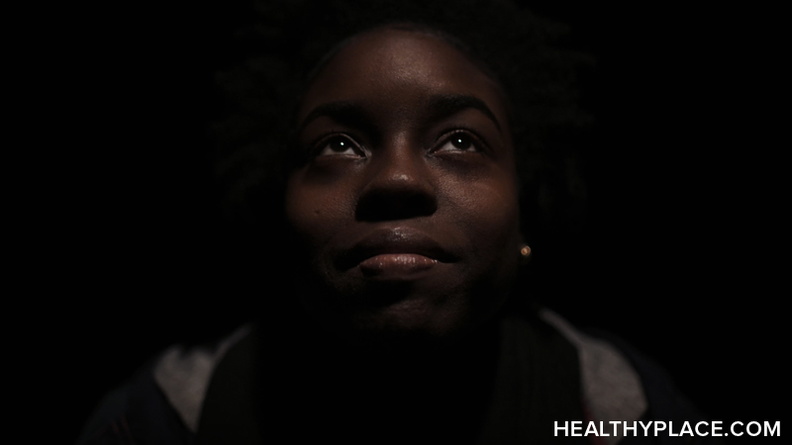Positive Thoughts for People with Mental Illness

When you have a mental illness, it often feels like there is a veil between you and the rest of the world, blocking positive thoughts from entering. However, this is not the case. Millions of people are walking around feeling exactly as you do. The key to breaking down these barriers that keep us locked in our negative thoughts is by making positive connections – to the world and to others. Positive thinking exercises can provide you with self-help techniques and coping strategies to make life with a mental illness a little easier. Here are some positive thoughts and exercises to give you a boost.
Are Positive Thoughts Possible When You Have a Mental Illness?
Yes, positive thoughts are entirely possible when you have a mental illness – just as they are when you have a physical ailment, such as the flu or a broken leg. However, it can be hard to break out of negative thought cycles when you have a mental health condition, however much you want to be positive ("Positive Reminders Help When Mental Health Is Challenging").
The first step toward accessing positive thoughts is to seek help for your condition. However much positive thoughts can help you treat your mental illness, they may not work on their own. People with mental health challenges often need treatment in the form of therapy, medication or a combination of the two. Other non-medical treatments include exercise, group therapy, art therapy and holistic remedies, depending on your condition. A treatment program should always be prescribed by your doctor or medical practitioner.
Adjusting Your Mindset for Positive Thoughts
The next step on your journey to positivity is to adjust your mindset. It’s important to remember that you are not your illness – that your mental health condition is something you have, not something you are. It doesn’t define you. In order to allow positive thoughts to enter your mind, you need to accept that happiness is not off-limits ("How to Create and Keep a Positive Mindset Despite Mental Illness").
In his bestselling memoir of anxiety and depression, Reasons to Stay Alive, the author Matt Haig argues that “It is possible to be a happy depressed person, just as it is possible to be a sober alcoholic.”
In other words, positive thoughts are not the opposite of depression, or any other mental health condition for that matter. It is possible to feel both – to be happy with your life, but still be depressed. It is also possible to feel no happiness at all, even during good times.
Tips for Welcoming Positive Thoughts
Positive thoughts are perhaps the greatest weapon you have during mental illness recovery. Whether you feel sad, mad or – as is common with depression – a state of total numbness, a moment that puts a smile on your face should not be underestimated. It is these moments that carry us through, bringing a little light to those dark times.
The key is to feed your mind with positive thoughts and distract yourself from negative emotions. With this in mind, here are some tips for welcoming positive thoughts:
- Spend time with positive people: Although mental illness can be isolating, it’s important to surround yourself with positive people who will help and support you. You should try to limit your exposure to negative people wherever possible.
- Avoid negative news: Want more positive thoughts in life? Rather than reading or watching the news, which tends to focus on negative events, try reading positive thinking articles instead. To stay updated on current affairs, seek updates from positive news updates from sites like Upworthy or The Good News Network.
- Practice positive affirmations: Come up with a positive affirmation or research affirmations on Pinterest. Repeat this affirmation to yourself throughout the day (either in your head or out loud) or write it down in your journal ("What Positivity Mantras Promote Mental Health?").
- Practice positive thoughts in the morning: Many people who have mental health conditions find mornings the hardest. If you’re someone who wakes up feeling negative, try practicing positive thoughts when you first wake up. You could start your day with a positive affirmation such as, “I will find the good in today,” or “I am strong” ("What Positive Thoughts Can Help Mental Health Recovery?"). Alternatively, you could practice a loving-kindness meditation using an app like Calm or Headspace or do some morning pages in your positivity journal.
Positive Thoughts as Part of Your Daily Routine
Try to build at least some of these positive thinking exercises into your daily routine. It will require some practice, and you may need to be disciplined with yourself to make sure you keep up the habit. Remember that positive thinking is not a passive pursuit: you will have to work on your mind to change the way it operates. However, you will soon see that the benefits of positive thoughts are worth the effort.
APA Reference
Smith, E.
(2021, December 31). Positive Thoughts for People with Mental Illness, HealthyPlace. Retrieved
on 2026, March 4 from https://www.healthyplace.com/self-help/positivity/positive-thoughts-for-people-with-mental-illness



